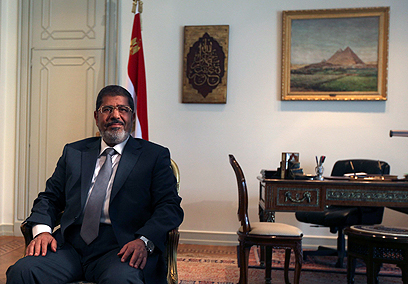
Morsi reconvenes Egyptian parliament
In a surprise move, newly elected Islamist president reassembles parliament in defiance of army generals, Supreme Court
Egypt's newly elected Islamist president, Mohamed Morsi, on Sunday ordered the country's Islamist-dominated parliament to reconvene in defiance of a military decree dissolving the legislature last month following a court ruling that a third of its members were illegally elected, the state news agency reported.
The surprise move by the Islamist president will almost certainly lead to a clash with the powerful generals who formally handed power to him on June 30 after spending 16 months at the nation's helm following the ouster of Hosni Mubarak in a popular uprising.
Related stories:
- Op-ed: Will Egypt's Morsi change? Hamas PM to meet Egypt president Morsi to make first official visit to Saudi Arabia
The decree by Morsi also called for new parliamentary elections to be held within 60 days of the adoption of a new constitution for the country, which is not expected before late this year.
Last month, the then-ruling military generals dissolved the legislature based on the ruling by the Supreme Constitutional Court, the country's highest tribunal.
The military announced a "constitutional declaration" on June 16 that gave it legislative powers in the absence of parliament and stripped Morsi of much of his presidential authority. It also gave the generals control over the process of drafting a new constitution and immunity from any civilian oversight.
Invitation to White House
Also on Sunday, US President Barack Obama invited Morsi to visit the United States in September, an Egyptian official said on Sunday, reflecting the new ties Washington is cultivating with the region's Islamists.
Washington, long wary of Islamists and an ally of ousted President Hosni Mubarak, shifted policy last year to open formal contacts with the Muslim Brotherhood, the group behind Morsi's win. Morsi formally resigned from the group after his victory.
Morsi's success at the polls mirrors the rising influence of Islamists in countries across the Middle East and North Africa in the wake of revolts and protests against autocratic rulers who have led the region for decades.

Morsi in his office (Photo: Reuters)
"President Obama extended an invitation to President Morsi to visit the United States when he attends the UN General Assembly in September," Egyptian aide Yasser Ali said after Morsi met US Deputy Secretary of State William Burns in Cairo.
Burns, who did not mention the invitation at a news conference earlier, pledged US support for Egypt's battered economy and said he welcomed Morsi's promise to uphold international treaties, which include a peace deal with Israel.
"We have taken careful note and appreciated President Morsi's public statements about a commitment to international obligations and we certainly attach great importance to Egypt's continuing role as a force for peace," Burns said.
Israel has watched with growing concern the political gains of the Brotherhood, an inspiration for the Palestinian militant group Hamas. The 84-year-old Brotherhood renounced violence as a means to achieve political change in Egypt decades ago.
Vital military aid
Analysts say that one way the United States could influence the direction of policy in Egypt, a nation at the heart of Washington's regional policy since a peace treaty was signed with Israel in 1979, would be through economic support.
Washington provides $1.3 billion a year in military aid as well as other assistance and could help mobilize other donors, lenders and investors. Those could prove vital as Egypt tries to stave off a balance of payments and budget crisis.
"The United States is firmly committed to doing everything that we can to support Egypt's economic revival. We understand the challenges that lie ahead and also the president does," Burns told reporters after his two-hour meeting with Morsi.
Burns, whose trip precedes a visit to Egypt on July 14 by US Secretary of State Hillary Clinton, said he had discussed a $3.2 billion loan package that Cairo has been negotiating with the International Monetary Fund.
"We talked in general terms about the value of moving ahead with the IMF in the interest of Egypt, trying to work out an equitable agreement that addresses Egypt's concerns and needs," he said.
He said the IMF package "can produce not only much needed resources but also sends an important positive signal to investors and donors and Egyptians as they move ahead on economic revival."
AP and Reuters contributed to this report
- Receive Ynetnews updates directly to your desktop










